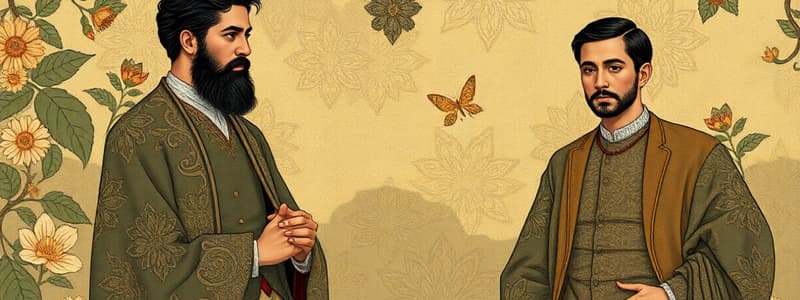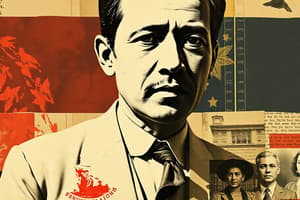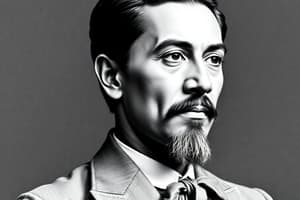Podcast
Questions and Answers
What is a Filipino social thinker?
What is a Filipino social thinker?
A Filipino social thinker is an individual who uses critical thinking and analysis to examine social issues and propose solutions for the betterment of Philippine society.
According to Alatas (2010), what is Jose Rizal considered?
According to Alatas (2010), what is Jose Rizal considered?
- The first Filipino journalist
- The first president of the Supreme Court
- The first Filipino lawyer
- The first systematic social thinker in Southeast Asia (correct)
What are the names of Rizal's two novels?
What are the names of Rizal's two novels?
Noli Me Tangere and El Filibusterismo
What did Noli Me Tangere focus on and reflect?
What did Noli Me Tangere focus on and reflect?
El Filibusterismo examined only the problems of Filipino society.
El Filibusterismo examined only the problems of Filipino society.
When was Apolinario Mabini born?
When was Apolinario Mabini born?
What role did Apolinario Mabini serve in government?
What role did Apolinario Mabini serve in government?
What was unique about Apolinario Mabini's leadership?
What was unique about Apolinario Mabini's leadership?
What are Apolinario Mabini's major works?
What are Apolinario Mabini's major works?
What was the purpose of Mabini's Decalogue?
What was the purpose of Mabini's Decalogue?
What were the main points of Mabini's Decalogue?
What were the main points of Mabini's Decalogue?
When was Isabelo de los Reyes born?
When was Isabelo de los Reyes born?
What did Isabelo de los Reyes write?
What did Isabelo de los Reyes write?
Isabelo de los Reyes supported the Spanish friars' actions.
Isabelo de los Reyes supported the Spanish friars' actions.
What role did Isabelo De los Reyes play in the Philippine Labor movement?
What role did Isabelo De los Reyes play in the Philippine Labor movement?
What did Claro Mayo Recto study?
What did Claro Mayo Recto study?
What was Claro Mayo Recto's view on the Philippine economy?
What was Claro Mayo Recto's view on the Philippine economy?
Claro Mayo Recto believed that the interests of the people should be sacrificed for any form of negotiation with foreign countries
Claro Mayo Recto believed that the interests of the people should be sacrificed for any form of negotiation with foreign countries
What role did Claro Mayo Recto serve in the Philippine government?
What role did Claro Mayo Recto serve in the Philippine government?
According to Claro Mayo Recto, what are the two twin goals that a country needs to achieve in order to develop?
According to Claro Mayo Recto, what are the two twin goals that a country needs to achieve in order to develop?
Flashcards
Filipino Social Thinker
Filipino Social Thinker
A person who uses critical thinking to analyze social issues in the Philippines and suggests solutions for improvement.
José Rizal
José Rizal
A significant Filipino social thinker and national hero during the 19th century.
Rizal's Writings (example)
Rizal's Writings (example)
Published materials like 'Philippines: A Century Hence' and 'The Indolence of the Filipinos.',
Social Ideas (Rizal)
Social Ideas (Rizal)
Signup and view all the flashcards
Noli Me Tangere
Noli Me Tangere
Signup and view all the flashcards
El Filibusterismo
El Filibusterismo
Signup and view all the flashcards
Colonial Knowledge critique
Colonial Knowledge critique
Signup and view all the flashcards
Colonial society theory
Colonial society theory
Signup and view all the flashcards
Emancipation Requirements
Emancipation Requirements
Signup and view all the flashcards
Spanish Colonial Criticism
Spanish Colonial Criticism
Signup and view all the flashcards
Philippine Backwardness
Philippine Backwardness
Signup and view all the flashcards
Pre-colonial Philippines
Pre-colonial Philippines
Signup and view all the flashcards
Colonized perspective
Colonized perspective
Signup and view all the flashcards
Spanish Colonial Cruelties
Spanish Colonial Cruelties
Signup and view all the flashcards
Spanish Colonial Hypocrisy
Spanish Colonial Hypocrisy
Signup and view all the flashcards
Philippine social realities
Philippine social realities
Signup and view all the flashcards
Study Notes
Introduction
- Filipino social thinkers have a rich history, influenced by colonization (Spanish and Japanese) and liberal ideas from around the world.
- These thinkers have used critical thinking to examine social issues and propose solutions for the betterment of Philippine society.
- Thinkers come from various fields like politics, literature, and diplomacy.
- They have greatly shaped the country's culture and identity.
- The presentation aims to introduce notable Filipino social thinkers and discuss their lives, works, and ideas.
Dr. José Rizal
- Rizal was a significant social thinker in the 19th century.
- Alatas (2010) considered him the first systematic social thinker in Southeast Asia.
- Born in Calamba, Laguna, in 1861.
- He finished Bachelor of Arts at Ateneo Municipal de Manila.
- Studied medicine in Spain, graduating from Universidad Central de Madrid.
- Rizal wrote for La Solidaridad, including articles like "Filipinas dentro de cien años" and "Sobre la indolencia de los Filipinos."
- His social ideas emphasized the need for a genuine propaganda campaign to inform people about the Philippines, their capabilities, and moral rights.
- His novels, Noli Me Tangere (1887) and El Filibusterismo (1891), had a significant impact on Philippine society, leading to a revival of Filipino nationalism during Spanish colonization.
- Rizal's works are a base for sociological theories.
- He offered different ways and requirements for Filipinos to achieve liberation from colonial rule.
- This included critiquing colonial knowledge of the Philippines, theorizing colonial society, and discussing emancipation.
- He criticized the corrupt Spanish colonial government and its officials.
- He argued that the Philippines' backwardness was due to indolence, but he also argued that Filipinos were not indolent before Spanish colonization, and had a rich and vibrant culture and prosperous economy.
- His writings proved significant advancements in Philippine agriculture and industry during pre-colonial times.
- He advocated for human rights, particularly women's rights, as seen in his "Letter to the Young Women of Malolos."
Apolinario Mabini
- Born in Talaga, Tanuan, Batangas, in 1864.
- Early education emphasized by his teacher, Fr. Valerio Malabanan.
- Studied at San Juan de Letran and the University of Santo Tomas.
- Practiced law and passed the bar exam in 1894.
- Became the first Prime Minister and Secretary of Foreign Affairs of the First Philippine Republic (1899).
- Advised President Emilio Aguinaldo in 1898.
- His influence changed the Filipino government from dictatorial to revolutionary.
- Provided a structure for the Philippine government during the Philippine Revolution.
- Considered the "brain and conscience" of the revolution
- Introduced different social philosophies in his political writings, including El Verdadero Decalogo, Ordenanzas de la Revolucion, and the Programa Constitucional de la Republica Filipina.
- He understood the problems of the Filipinos under the Spanish colonial government.
- Argued for the Filipinos to assert their rights and establish self-government institutions.
- Believed genuine social renewal required radical institutional and personal changes in Filipinos' way of thinking and living.
- External and internal revolution was necessary for moral education and to do away with inherited vices.
- Defined the role of government as needing an intellect to guide, a will to make it work, and a will to punish the bad and to have these powers independent of each other, with the last subordinate to the first.
Isabelo de los Reyes
- Born in Vigan, Ilocos Sur, in 1864.
- Studied at Colegio de San Juan de Letran and the University of Santo Tomas.
- Founded the first vernacular newspaper in the Philippines, El Ilocano.
- Conducted studies on Philippine history and culture (e.g., Las Islas Visayas en la Epoca de la Conquista, La Expedicion de Li-Mahong contra Filipinas)
- Like Rizal, he criticized the friars' ownership of extensive haciendas and advocated for agrarian reform.
- Served as a lawyer, folklorist, journalist, and as a Manila city councilor and senator.
- Openly attacked the Americans during the American occupation.
- Showed support for the First Philippine Republic.
- Founded two periodicals in Spain (El Defensor de Filipinas and Filipinas Ante Europa).
- Published books on independence, revolution, and the Katipunan.
Claro M. Recto
- Born in Tiaong, Tayabas (Quezon), in 1890.
- Graduated at the Ateneo de Manila and the University of Santo Tomas.
- Served as legal adviser to the Philippine Senate (1916-1919).
- Elected as representative of the third district of Batangas, House minority leader, and re-elected several times.
- Became a senator of the Republic of the Philippines, majority floor leader, and president pro tempore of the Senate.
- Recognized as a nationalist and as a “living legend in his lifetime.”
- Emphasized nationalism, economic independence, foreign affairs, democracy, and civil liberties.
- Viewed nationalism as Filipinos' dedication to their country, unity, and independence.
- Believed that national interests are not negotiable.
- Considered industrialization and nationalism as twin goals for a developing country.
- Emphasized complete Filipino control over the country's economy and believed the country's economy depends on those who control its purse.
Studying That Suits You
Use AI to generate personalized quizzes and flashcards to suit your learning preferences.




